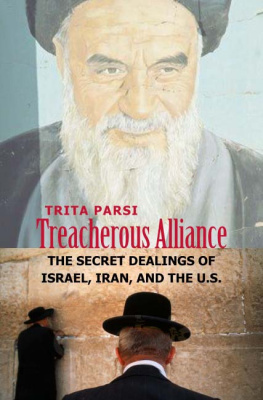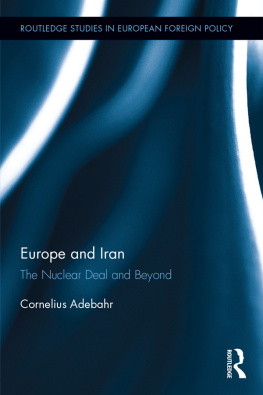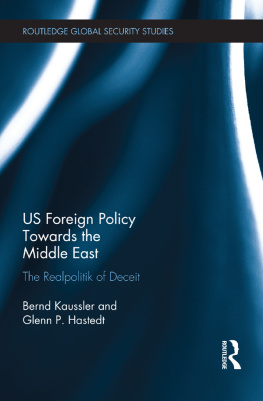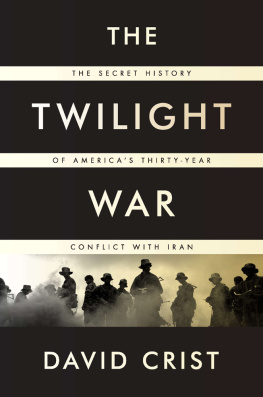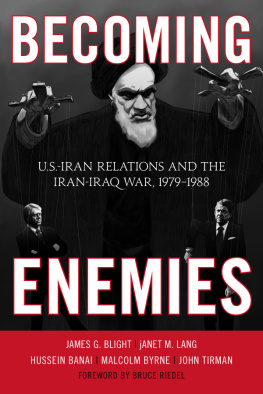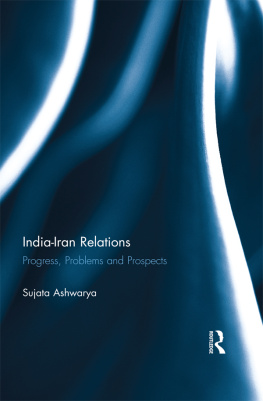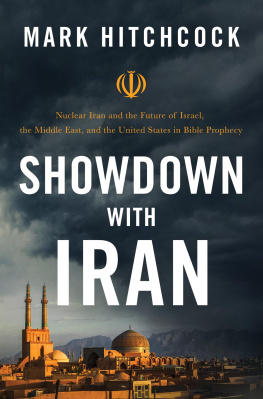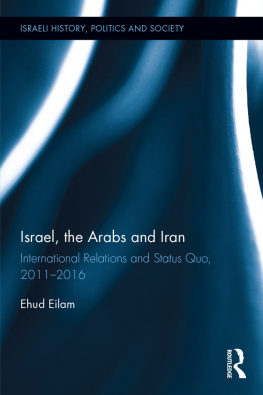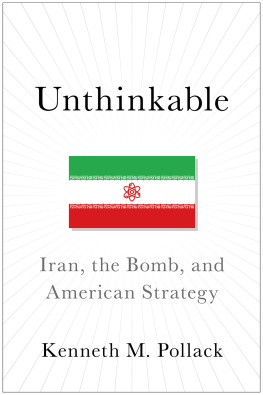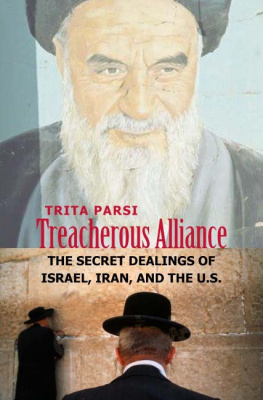TREACHEROUS
ALLIANCE
A Caravan book. For more information, visit www.caravanbooks.org.
Copyright 2007 by Yale University.
All rights reserved.
This book may not be reproduced, in whole or in part, including illustrations, in any form (beyond that copying permitted by Sections 107 and 108 of the U.S. Copyright Law and except by reviewers for the public press), without written permission from the publishers.
Set in Minion and Franklin Gothic types by The Composing Room of Michigan, Inc. Printed in the United States of America.
Library of Congress Cataloging-in-Publication Data
Parsi, Trita.
Treacherous alliance : the secret dealings of Israel, Iran, and the United States /
Trita Parsi.
p. cm.
Includes bibliographical references and index.
ISBN 978-0-300-12057-8 (hardcover: alk. paper)
1. IranForeign relationsIsrael. 2. IsraelForeign relationsIran.
3. United StatesForeign relationsMiddle East. 4. Middle East
Foreign relationsUnited States. I. Title.
DS274.2.I75P37 2007
327.5694055dc22
2007018945
A catalogue record for this book is available from the British Library.
The paper in this book meets the guidelines for permanence and durability of the Committee on Production Guidelines for Book Longevity of the Council on Library Resources.
10 9 8 7 6 5 4 3 2 1
To Amina
For your love, for your laughter
and for standing firm when weaker hearts succumb
And to Darius, my eternal love
I hope to be as good of a parent to you as my parents were to me
CONTENTS
CHAPTER 1
Introduction: An Eight-Hundred-Pound Gorilla
CHAPTER 2
An Alliance of Necessity: The Secret Friendship of the Shah
CHAPTER 3
Rise of Israel, Rise of Iran
CHAPTER 4
Iran's Quest for Supremacy
CHAPTER 5
Sealing Demise in the Moment of Triumph
CHAPTER 6
Megalomania
CHAPTER 7
The Rise of Begin and the Israeli Right
CHAPTER 8
Enter the Sign of God
CHAPTER 9
Ideological Shifts, Geopolitical Continuities
CHAPTER 10
Saddam Attacks!
CHAPTER 11
Scandal
CHAPTER 12
The Dying Gasp of the Periphery Doctrine
CHAPTER 13
The New World Order
CHAPTER 14
Trading Enemies
CHAPTER 15
From Cold Peace to Cold War
CHAPTER 16
With Likud, the Periphery Doctrine Returns
CHAPTER 17
Khatami's Dtente
CHAPTER 18
Betrayal in Afghanistan
CHAPTER 19
Snatching Defeat from the Jaws of Victory
CHAPTER 20
Facing the Future, Facing Reality
APPENDIX A: IRAN'S MAY 2003 NEGOTIATION PROPOSAL
TO THE UNITED STATES
APPENDIX C: LETTER FROM AMBASSADOR GULDIMANN
TO THE U.S. STATE DEPARTMENT
PREFACE
Israeli-Iranian relations remain a mystery to most analysts in spite of the profound impact that these countries tensions have had on the Middle East and on U.S. national security. The political sensitivity of the issue has prompted most U.S. experts to refrain from studying the subject in detail. Instead, the poor state of relations between these two former allies has been treated either as an inexplicable phenomenon or as purely the result of deep-seated ideological antagonism. All the while, its impact on U.S. foreign policy has been conveniently ignored at a great cost to U.S. national interests. While it is widely believed that the key to peace in the Middle East is the resolution of the Israeli-Palestinian conflict, little attention has been given to the key geopolitical rivalry between Israel and Iran, which has had a decisive influence on this and other regional conflicts.
In examining the ups and downs in Israeli-Iranian relations and the triangular relationship between the United States, Israel, and Iran, I have focused on geopolitical forces and developments rather than on ideology, fleeting political justifications, or simplistic Manichean perspectives. I argue that the major transformations of Israeli-Iranian relations are results of geopoliticalrather than ideologicalshifts and that a negotiated resolution of their strategic rivalry will significantly facilitate the resolution of other regional problems rather than the other way around.
The current enmity between the two states has more to do with the shift in the balance of power in the Middle East after the end of the Cold War and the defeat of Iraq in the first Persian Gulf War than it does with the Islamic Revolution in 1979. Though the Iranian revolution was a major setback for Israel, it didn't stop the Jewish State from supporting Iran and seeking to improve its relations with the Khomeini government as a counter to Israel's Arab enemies. Ironically, when Iranian leaders called for Israel's destruction in the 1980s, Israel and the pro-Israel lobby in Washington lobbied the United States not to pay attention to Iranian rhetoric. Today, even though Iran's revolutionary Islamist zeal is far from what it was in the 1980s, things have changed quite a bit. The Iranian government, in turn, has pursued a double policy throughout this period: In the 1980s, Iran made itself the most vocal regional supporter of the Palestinian cause. Yet its rhetoric was seldom followed up with action, since Tehran's strategic interestreducing tensions with Israel and using the Jewish State to reestablish relations with the United Statescontradicted Iran's ideological imperatives. After 1991 and the efforts by the United States and Israel to create a new Middle East order based on the Israeli-Palestinian peace process and on Iran's prolonged isolation, however, Iran's ideological and strategic interests overlapped, and Tehran decided for the first time to become a frontline opponent of the Jewish State. At this stage, both Israel and Iran used their influence to undermine U.S. foreign policy initiatives that they deemed beneficial to the other. Iran worked against the peace process, fearing that it would be left isolated in the region, and Israel sought to prevent a U.S.-Iran dialogue because it feared that Washington would betray Israeli security interests if Iran and the United States were to communicate directly. To this day, that logic prevails in both capitals, and it is fueling the tensions in the region.
This is a book about foreign policy. My focus is on the relations between these states and not on internal developments thatwhile importanthave little or no impact on their respective foreign policies. Nor do I seek to provide a deeper explanation of the ideologies espoused by the leaders of these states. Instead, these ideas and worldviews are considered relevant only to the extent that they influence Iran's and Israel's foreign policy. This approach does not mean, though, that these ideologies are wholly irrelevant or that the belief in them is put under question. On the contrary, both Israeli and Iranian leaders have strongly held ideologies and worldviews, which they take most seriously. Whether these ideologies are the chief determining factor in Israeli-Iranian relations, however, is a different question altogether.
Precisely because of the sensitivity of this issue, very little has been written about Israeli-Iranian relations or their impact on U.S. foreign policy. It has been almost two decades since a book on Israeli-Iranian relations was published in English, and many of the analyses about Iran produced in the United States in this period have suffered from Western analysts lack of access to Iran and Iranian officials. This has particularly affected the study of convoluted issues such as the relations between the United States, Iran, and Israel. To avoid these pitfalls, the bulk of this book is based on 130 in-depth interviews I've conducted with Iranian, Israeli, and American officials and analysts.
Next page
